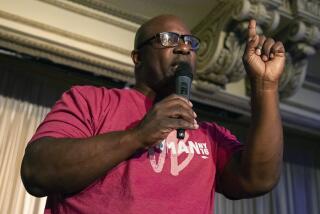In New York Republican governor’s race, the GOP establishment is the loser
- Share via
Reporting from Los Angeles — Upended by a vocal and angry conservative movement, Tuesday night’s Republican primaries have one important political facet in common: The writ of the GOP establishment doesn’t run much beyond the party walls.
National attention will likely focus on Delaware, where a Sarah Palin-endorsed outsider defeated a Republican stalwart for the Senate nomination, and on New Hampshire, where a GOP insider was trying to stave off another “tea party” movement favorite. But the biggest upset of the night was the sound trouncing administered by Buffalo-area businessman Carl P. Paladino to the Republican Party choice for governor, Rick Lazio.
If the tea party can make it in New York, it can make it anywhere. Clearly visible were the movement’s themes during its successful nominating season in a broad range of states like Kentucky, Nevada, Alaska, Utah, Florida and Delaware.
To win the GOP nomination, Paladino capitalized on a weak state Republican Party structure, a volcano of populist anger over the perceived failures of government in Albany and in Washington and a floundering economy. To channel that anger, Paladino was able to use as much as $3 million of his own to fuel his campaign.
All of those ingredients -- anger at existing institutions, shock troops to make calls and get out the vote, and money to fuel the electoral machine -- are readily available in this midterm election cycle. Nationally and in New York, Republicans have a collection of new and unsought candidates – many of whom face uphill fights in getting elected in the November elections. Some Democrats are already gloating over running against people they have branded as (quoting Pennsylvania Gov. Ed Rendell) “wackos” and “fruit loops” for their conservative political positions.
To some outsiders, New York is still, but inaccurately, seen as the home of the so-called Rockefeller Republicans, liberal on lifestyle issues but willing to use government power and money to deal with social issues such as education and poverty. That group was powerful in the 1960s but has long since left the scene.
The more recent generation of Republicans leaders were former Gov. George Pataki and former Sen. Alfonse D’Amato, conservatives by most measures. Even the more liberal Republicans, such as former New York Mayor Rudy Giuliani and current Mayor Michael Bloomberg (now an independent) have a strong conservative streak on fiscal and foreign issues.
But despite those electoral successes, the state party has fallen on hard times. Its candidate, Lazio, was once a bright prospect but was tarnished in a losing Senate bid against Hillary Rodham Clinton. In this cycle, Republicans were even unable to capitalize on an opportunity to run a strong race against Kirsten Gillibrand, an appointed Democratic senator. She too, is consider a prohibitive favorite in November.
With a party unable to deliver and a wave of voter anger that couldn’t be dammed, Lazio never seemed to learn how to surf as well as did an outsider like blunt-speaking Paladino, who used fiery language more suitable to liberals than to conservative Republicans.
“We are mad as hell,” Paladino said Tuesday night. “Tonight the ruling class knows that there’s a people’s revolution.”
Paladino faces state Atty. Gen. Andrew Cuomo, son of a former Democratic governor. The polls have Cuomo running well ahead with some seven weeks to go.
michael.muskal@latimes.com
twitter.com/LATimesmuskal
More to Read
Get the L.A. Times Politics newsletter
Deeply reported insights into legislation, politics and policy from Sacramento, Washington and beyond. In your inbox twice per week.
You may occasionally receive promotional content from the Los Angeles Times.











